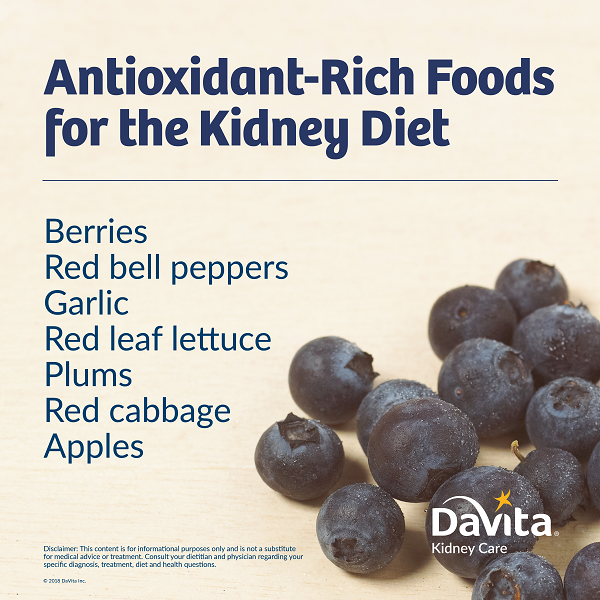Food Facts Friday: Blueberries in the Kidney Diet
July is National Blueberry Month! Add blueberries to your menu.
Summer is the perfect time of year to enjoy delicious, fresh, seasonal produce. Naturally low potassium, phosphorus and sodium content, blueberries are a great match for a kidney-friendly diet.1, 2
Serving Size and Nutrition Facts
One cup of blueberries is considered a serving. It contains 84 calories, 1g protein, 0.5 g fat, 21 g carbohydrate, 3.6 g fiber, 15 g sugar, 114 mg potassium, 18 mg phosphorus and 2 mg sodium.
Blueberries are often termed a “super food” due to their rich antioxidant content. These berries are a good source of vitamin C. This antioxidant vitamin is important for synthesis of collagen and hormones. In addition, it aids in wound healing and iron absorption.3 Vitamin C promotes a healthy immune function. Also, blueberries are rich in vitamin K. It is important for making blood clothing factors. In addition, vitamin K may help protect against heart and bone disease.2,3 Blueberries also contain some B vitamins, folate and vitamin E.2 For more information about antioxidants and the kidney-friendly diet read “10 Antioxidant Foods for the Kidney Diet” on DaVita.com.
Studies have shown that blueberries can help maintain a healthy brain by preventing cognitive decline and supporting memory.4 Blueberries may also benefit mood and reduce depression in older adults, prevent cardiovascular and Alzheimer’s disease, and promote healthy blood pressure and blood glucose levels. 4
Cost
When not in season blueberries can be quite expensive. However, when purchased in season, the price typically drops. The average retail price of blueberries is about $4.73 per pound, which is about $1.59 per cup.5
Frozen blueberries are a more cost efficient option and are usually cost less when berries are not in season. Average retail price of frozen blueberries is $3.64 per pound, or $1.20 per cup.5 Frozen berries are frozen immediately after harvest before any nutrients are lost.
Choosing Blueberries
When choosing fresh blueberries pick those that are plump and blue in color. If the skin is wrinkled or shriveled it may mean the blueberries are old. Avoid blueberries that appear wet.6
Storing Blueberries
Blueberries should be stored unwashed in the refrigerator and will last up to 7 days.6 Wash the berries right before eating. To preserve fresh blueberries place in freezer bags and freeze for up to 3 months.
DaVita Recipes
Blueberries are delicious when eaten fresh on their own or on top of oatmeal, cereal, or yogurt. In addition, they are delicious cooked in baked goods or as compote or blended into smoothies. Try these 6 Blueberry Delights for a Kidney-Friendly Diet.
For more DaVita information and resources on the kidney diet click here.
Resources
- Health Benefits of Blueberries. U.S. Highbush Blueberry Council. https://www.blueberrycouncil.org/blueberry-nutrition/health-benefits-blueberries/Accessed June 27, 2018.
- Basic Report: 09050, Blueberries, raw. USDA: Agricultural Research Service. National Nutrient Database for Standard Reference Legacy Reference. https://ndb.nal.usda.gov/ndb/foods/show/301068?manu=&fgcd=&ds=&q=Blueberries, raw. Accessed June 28, 2018.
- Byrd-Bredbenner, C., Moe, G., Beshgetoor, D., Berning, J. Perspectives in Nutrition, 8th edition. McGraw Hill Higher Education. New York, NY. 2009. P. 424, 470-474.
- Fruit and Vegetable Prices. USDA Economic Research Service. Last updated March 19, 2015. Accessed June 28, 2018.
- Blueberries: Nutrition. Selection. Storage. Fruits and Veggies More Matters. https://www.fruitsandveggiesmorematters.org/blueberries-nutrition-selection-storage. Accessed June 28, 2018.
This article is for informational purposes only and is not a substitute for medical advice or treatment. Consult your physician and dietitian regarding your specific diagnosis, treatment, diet and health questions.



Recent Comments